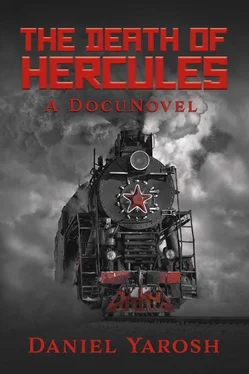Zalmund stared at him dumbfounded, and then coughed into his sleeve to gather his wits. “Me, no. I am an owner. I got my piece when the previous pimp couldn’t pay his loan. Sometimes the girls need a little help on Saturday when business is good.”
“Ah,” Schlosser nodded. “Ever sample the merchandise?”
“No, no. Otherwise, I’d need a shot!” They both laughed in a derisive, snobbish chuckle, knowing that if the opportunity arose, it might be different.
They chatted on quietly with patches of silence. Zalmund did learn something from Schlosser that he had not known. Schlosser snickered with schadenfreude about the trial of the British diplomat Bruce Lockhart, which had just concluded. He was convicted and sentenced to death in abstentia for providing Lenin’s assassin Fanya Kaplan with a fake Cheka pass, allowing her to cross the border from Latvia. Two other employees of the British embassy were convicted and executed. Schlosser seemed to have all the details, no doubt each morsel shared and chewed over among the Austrian troops, who held no love for the Bolsheviks.
Zalmund asked about Schlosser’s life. Yes, he was a farmer with a small plot of land, a wife and two small boys. Should he have deserted and gone home earlier, when the war was clearly lost, as many had done? Maybe, he said. But with this last paycheck he probably made enough to get through the winter, and certainly more than if he tried to sell crops in this chaotic market. “And you,” he asked Zalmund.
“Ah, there’s a girl with me,” he said. “No, not married. She has beautiful red hair and a smile to melt your heart. A will of steel and she is tough,” he said. “She can shit in the woods, if you know what I mean.”
“What does she think of your business?” Schlosser asked with a wry smile.
“I don’t talk about my business with her,” Zalmund said angrily. “She knows I do what I have to do to get along in these times.”
“And her family?” Schlosser asked.
“Oh, yeah. They hate me. Starting with her brother. Her father won’t talk to me, her mother spits at my name. I can’t go around there. When I went to get her for the last time, her brother threw a pitchfork at me. Yeah. Stuck right straight up in the road behind us as we were leaving.”
“So no wedding date?”
“No,” Zalmund chuckled, relaxed and sat back. He coughed. “No, we don’t talk about that.”
“Is she young?” Schlosser asked.
“Yeah,” Zalmund smiled. “Nineteen. She has all these ideas about how the world could be. How we could love each other and help each other. But she is hard on me. Very hard. She is a modern girl. Freedom, free love,” Zalmund sighed. “With everyone but me.” Schlosser chuckled, and Zalmund went on. “I think about her all the time. I want to show her the world, how things could be, not just the way they have always been. But we don’t always follow the rules. I wish I had rules for her love. But we seem to go from here to there, thinking only about today, not tomorrow. That is what I have with her.”
“Ah, it’s the same when you are married,” Schlosser sighed. “All the romantic walks, the secret whispers, are gone. It’s the baby’s milk today, what will we do for bread tomorrow? That’s what we have.”
“Are you sure about her, when you are off with your unit?” Zalmund asked.
“Oh, yeah. My parents are in the same village. She is not messing around with my mother checking in,” Schlosser laughed softly.
Zalmund laughed with him, which turned into a coughing fit. When he subsided, he wiped his lips on his sleeve. “I didn’t worry about it for a long time. We were always into something, a little on the edge. I didn’t think anyone was on our planet. But now there’s this new guy, snooping around, showing up all the time. He is polite and proper, I can’t fault him. But I can’t help thinking she might be interested. I should put an end to it.” Zalmund glanced over to Schlosser to gauge his reaction, but his head was back, and his eyes were closed.
“You should see our medic about that cough when we get to camp,” Schlosser said quietly.
The train slowly pulled into the station at Oswiecim, which was part of the Austrian Imperial-Royal Landwehr Command of Krakow that defended the homeland. They arrived on a platform next to a half-dozen parallel tracks, and red brick storehouses lined the station. Past the storehouses were three stone barracks, or Kasernes, with rooms for 50 or so men each, where later 700 Jews would fill each building. Schlosser led him to the middle barrack, where the lights were still on despite the late hour. They ducked inside.
Most of the soldiers stood talking around the central cast iron stove, wearing some part of their grey uniforms. Wood, double-decked bunks surrounded the center and a few men tried to sleep on the straw mattresses. Several men nodded to Schlosser as he entered, and then stared at Zalmund with suspicion. Schlosser explained softly to a few that he was there to change their krone to marks. They gathered to hear the terms, and then others joined the circle.
A private in the Austrian army earned the equivalent of about $5 per month, compared to an American soldier who was paid about $30 month. But these soldiers were being paid in Austrian krone, by a government that has lost a world war and was disintegrating. The value of the currency would fall in half by the time they made it back home. The German mark was also in decline, but much stronger than the krone, and so soldiers were anxious to guarantee their earnings. Zalmund patiently worked his way through the three barracks, trading all the marks he brought for Austrian krone at a bountiful exchange rate. When he handed over the last money bill, he was offered an empty straw bed. He slipped his suitcase under the bed. His chest hurt, his lungs bubbled, his muscles ached, and he finally slept.
The next morning, he was on a military train to Krakow, filled with joyous retired soldiers on their way home. They did not notice a wheezing and feverish Zalmund Hofitz in a back-corner seat, clutching his black coat, his fedora pulled down over his face and with his suitcase on his lap.
**********
The Saturday night before, Deena and Max had sat next to each other on the train from Katowice to Krakow, in shocked and exhausted silence. Once, they each began to speak, waited for the other, then sat back again in quiet.
Max was filled with a cacophony of emotions. Of course, he was disturbed by the mass deaths at Altmann’s house but stupefied by Zalmund’s premeditated and highly efficient one-man reckoning. This was not the work of any rational man he knew. He certainly felt no culpability but was equally sure the police would not see it that way. Thus he was more than elated to be on a train out of town. And here he was, alone in a crowded train with Deena. He felt the exhilaration of the opportunity from the clenching in his belly to the tightness in his throat, which choked the words before they could leave his mouth. Now was his chance to talk with her alone, look into her fierce eyes and show her that another world awaited her. She did not need to live in this deathtrap of irrational politics, rival nationalities, conflicting religions and ethnicities that had torn the lives of this whole world apart and left them all in flakes and ashes. She held within her the spark of wonder that he saw wasted on these old-world troubles, never to be resolved and soon to extinguish her spirit. He could not look at her but want to touch her, hold her, stroke her hair and point to a new world, in America. But he tripped over the first word.
“Zalmund did not look well. How sick is he?” he said. Max immediately regretted his clumsiness. Here was his chance to win her, and all he could do was bring up another man. Idiot!
Читать дальше












